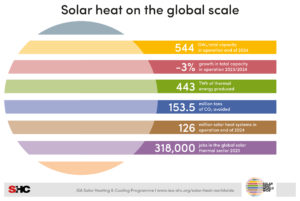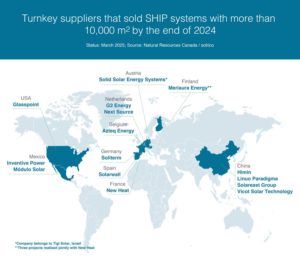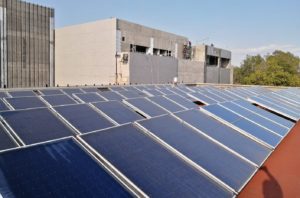Europe: Solar Thermal Energy Expands to Industrial Processes
April 1, 2013
During a Technology Workshop on Solar Process Heat for Industry organised by the Solar Thermal Technology Panel of the RHC-Platform, the European Technology Platform on Renewable Heating and Cooling, European experts presented the latest developments and insights into collector technology, as well as solar thermal system integration for industrial processes, ranging from drying to pasteurisation and sterilisation. Around 60 participants from the industry, research, industry associations and EU institutions attended the workshop held at the Renewable Energy House in Brussels on 15 March 2013.
Case studies from some high-potential sectors illustrated how to integrate solar process heat in industrial applications. For example, Ludwig Scheller from GEA Brewing Systems, Germany, explained the challenges of incorporating solar thermal energy into brewing processes (see the attached presentation). “A modern brewery with an energy storage system and approx. 80 % of its beer sales in returnable bottles consumes 19.3 kWh per hectolitre (100 litres) of thermal energy from fossil fuel sources,” Scheller said, giving a rough estimate.
The expert introduced the EU FP7 (Seventh Framework Programme for Research) project “SOLARBREW: Solar Brewing the Future”, which will run from 2012 to 2015. The objective of the project is to demonstrate the technical and economic feasibility of integrating large-scale solar thermal systems into brewing processes. This involves setting up three large-scale solar thermal systems at three different sites of Dutch producer Heineken: one for drying at a malting plant, one for mashing at a brewery and one for pasteurising at another brewery. The total installed capacity of the three plants is said to be 5.08 MWth, which corresponds to 7,270 m² of collector area.
Oliver Iglauer from Dürr Systems GmbH, Germany, analysed the use of solar process heat in sustainable car manufacturing (see the attached presentation). “Solar process heat can significantly reduce the carbon footprint in painting, for example, in car body curing,” Iglauer said. “Due to waste heat recovery systems providing thermal power at approx. 100 °C, it is essential to integrate concentrating solar thermal collectors of up to 400°C.” Iglauer described a pilot installation with six modules, an aperture area of 132 m² and 74 kW of thermal peak power.
Stefan Minder, NEP Solar, Switzerland, gave examples of concentrated solar systems with parabolic trough collectors (PTC) in Switzerland’s dairy industry (see the attached presentation). For example, Swiss company LESA Bever had 115 m² of PTC installed at its factory. Operated with thermal oil, the system achieves temperatures of up to 190°C during indirect steam generation and milk processing.
The event confirmed the huge potential of the process heat segment. In its Energy Technology Perspectives 2012 (ETP2012), the IEA estimates that Europe’s 2010 heat demand for industrial processes was 165 Mtoe (1.9 Mio GWh). Virtually all process heat is produced by fossil fuel combustion, with a huge effect on greenhouse gas emissions. The IEA Solar Heating and Cooling Technology Roadmap states that 20% of the energy used for low temperature industrial heat (<120°) could be provided by solar process heat by 2050. “The IEA roadmap identifies the worldwide potential of solar industrial process heat by 2050 to be equivalent to that of solar water heating and solar space heating combined,” says Werner Weiss, Chairman of Solar Heating and Cooling Programme of the International Energy Agency (IEA) and Board Member of the RHC-Platform (see the attached presentation).
“Although Heating and Cooling represents 47% of the energy demand in Europe, the EU has allocated less than 8% of the FP7 Energy funds to this sector,” says Gerhard Stryi-Hipp, President of the RHC-Platform. He added, “The European Union and its Members States need to wake up, unlock the potential of Renewable Heating and Cooling and explore this cost-effective way to cut CO2 emissions.”
More information:
http://www.rhc-platform.org


